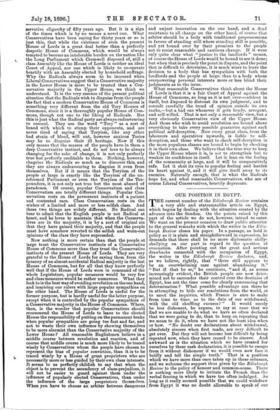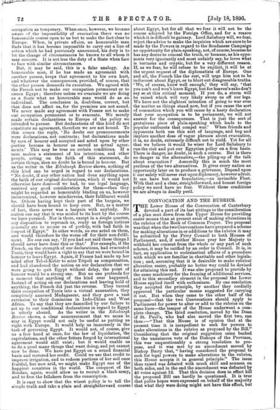OUR POSITION IN EGYPT. T HE current number of the Edinburgh
Review contains a very able and statesmanlike article on Egypt, which begins by dealing with the situation created by the advance into the Soudan. On the points raised by this part of the article we do not, however, intend to enter. We want on the present occasion to draw public attention to the general remarks with which the writer in the Edin- burgh Review closes his paper. In a passage, as bold in policy as it is plain and straightforward in expression, he demands that there shall be no more diplomatic shilly- shallying on our part in regard to the question of evacuation. After pointing out the great and serious drawbacks connected with the occupation of Egypt, the writer in the Edinburgh Review declares, and, as we believe, rightly, that "there still appears to be an overwhelming case against abandoning it." "But if that be so," he continues, "and if, as seems increasingly evident, the British people are now deter- mined not to surrender their control over the destinies of Egypt, has not the time come for clearly announcing that determination ? What possible advantage can there be in attempting to hide our resolutions from the world, or to meet the inquiries, which France is sure to make from time to time, as to the date of our withdrawal, with the old shuffling excuses ? " It would surely be less dishonest, he argues, to say at once that we find we are unable to do what we have so often declared that we were going to do, than to keep on repeating that we mean to do it, when we have not the least idea when or how. "No doubt our declarations about withdrawal, absolutely sincere when first made, are very difficult to get over. But they will not become less difficult by being repeated now, when they have ceased to be sincere. And awkward as is the situation which we have created for ourselves by these rash declarations, it is possible to escape from it without dishonour if we would even now face it boldly and tell the simple truth." That is a position which we have more than once taken up in these columns, and we welcome the support thus given by the Edinburgh _Review to the policy of honour and common-sense. There is nothing more likely to irritate the French than the verbal fencing in which we have too often indulged. As long as it really seemed possible that we could withdraw from Egypt it was no doubt allowable to speak of our occupation as temporary. When once, however, we became aware of the impossibility of evacuation there was no honourable course open to us but to make the fact clear to Europe. When, in private affairs, an honourable man finds that it has become impossible to carry out a line of action which he had previously announced, his duty is to let the change of circumstances be known to all whom it may concern. It is not less the duty of a State when face to face with similar circumstances.
But, it may be said, this is a false analogy. An honourable man, if he has made an agreement with another person, keeps that agreement to his own hurt, and whatever the consequences, provided, of course, that the other person demands its execution. We agreed with the French not to make our occupation permanent or to annex Egypt ; therefore unless we evacuate we are doing as a State what no honourable man would do as an individual. The conclusion is, doubtless, correct, but that does not affect us, for the premises are not sound. We never made any agreement with France not to make our occupation permanent or to evacuate. We merely made certain declarations to Europe of the policy we intended to pursue. But declarations of this kind do not constitute an agreement, therefore we are not bound. To this comes the reply, No doubt our pronouncements were declarations, not contracts ; but declarations made by men of honour and accepted and acted upon by other -parties become in honour as sacred as actual agree- ments.' This may be true on certain conditions. If a man makes a statement of his intentions, and other people, acting on the faith of this statement, do certain things, then no doubt he is bound in honour. But as the writer in the Edinburgh _Review shows, nothing of this kind can be urged in regard to our declarations. "No doubt, if any other nation had done anything upon the faith of our original declarations, which it would not otherwise have done—if we had, to use legal language, received any good consideration for them—then they might be regarded as honourably binding on us, however inconvenient, however mischievous, their fulfilment would be. Others having kept their part of the bargain, we should have been bound to keep ours. But, as a matter of fact, there never was a bargain with anybody. No .nation can say that it was misled to its hurt by the course we have pursued. Nor is there, except in a single quarter, any disposition to reproach us, ready as foreign nations generally are to accuse us of perfidy, with bad faith in respect of Egypt." In other words, no one acted on them, and would therefore be the worse off for their non-fulfil- ment. No one can say, If you had not said these things I should never have done this or that.' For example, if the French, on the strength of our declarations, had evacuated Tunis, they would have a right to say that we were bound in honour to leave Egypt. Again, if France had made up her mind after Tel-el-Kebir to seize Tripoli as compensation, and had abandoned the notion on our declaration that we were going to quit Egypt without delay, the point of honour would be a strong one. But no one pretends for a moment that anything of the kind ever happened. Instead of acting on our declarations and leaving hold of anything, the French did just the reverse. They turned their occupation of Tunis into a virtual annexation, they completely annexed Madagascar, and they gave a vast extension to their dominions in Indo-China and West Africa. To say that they are damnified by our failure to act up to our conditional declarations in regard to Egypt is utterly absurd. As the writer in the Edinburgh -Review shows, a clear announcement that we mean to stay in Egypt would not only be useful as putting us right with Europe. It would help us immensely in the task of governing Egypt. It would not, of course, give us a free hand at once, for the law of liquidation, the .eapitulations, and the other fetters forged by international agreement would still exist; but it would enable us to do a good many things that want doing, and yet cannot now be done. We have put Egypt on a sound financial basis and restored her credit. Could we use that credit to improve irrigation, and to redeem portions of her soil once fruitful, but now arid, we might make Egypt one of the happiest countries in the world. The conquest of the Soudan, again, would allow us to recruit a black army, and to free the fellaheen from the conscription.
It is easy to show that the wisest policy is to tell the simple truth and take a plain and straightforward course about Egypt, but for all that we fear it will not be the course adopted by the Foreign Office, and for a reason which it is difficult to gainsay. Lord Salisbury will, we fear, reject the advice to make the inquiries which are sure to be made by the Powers in regard to the Soudanese Campaign an opportunity for plain-speaking, not, of course, because he has any desire to conceal the truth, or because, as his oppo- nents very ignorantly and most unfairly say, he loves what is tortuous and cryptic, but for a very different reason. If, as we fear, he will refuse to be explicit, it will be at the urgent request of the diplomatists of Europe. One and all, the French like the rest, will urge him not to be indiscreet about Egypt, or to blurt out disagreeable truths. We, of course, know well enough,' they will say, that you can't and won't leave Egypt, but for heaven's sake don't say so at this critical moment. If you do, a storm will be raised which will very likely sweep us off our legs. We have not the slightest intention of going to war over the matter as things stand now, but if you cause the sort of commotion which you will cause by a hasty declaration that your occupation is to be permanent, we will not answer for the consequences. That is just the sort of gratuitous piece of plain-speaking which leads to the popular outbursts that compel war.' When friends and opponents both use this sort of language, and beg and implore another dose of vague phrases about evacuation, it is, no doubt, extremely difficult not to yield. Yet for all that we believe it would be wiser for Lord Salisbury to run the risk and put our Egyptian policy on a firm basis. There is danger, no doubt, in such a course. But is there no danger in the alternative,—the piling-up of the talk about evacuation ? Assuredly this is much the most perilous of the two alternatives. It gives every nation an opportunity later on to produce a grievance. Depend upon i our safety will never rest upon diplomacy, however adroit. It can have but one foundation,—an invincible Fleet. With that and a clear, straightforward, and honest foreign policy we need have no fear. Without those conditions we are always in deadly peril.



































 Previous page
Previous page